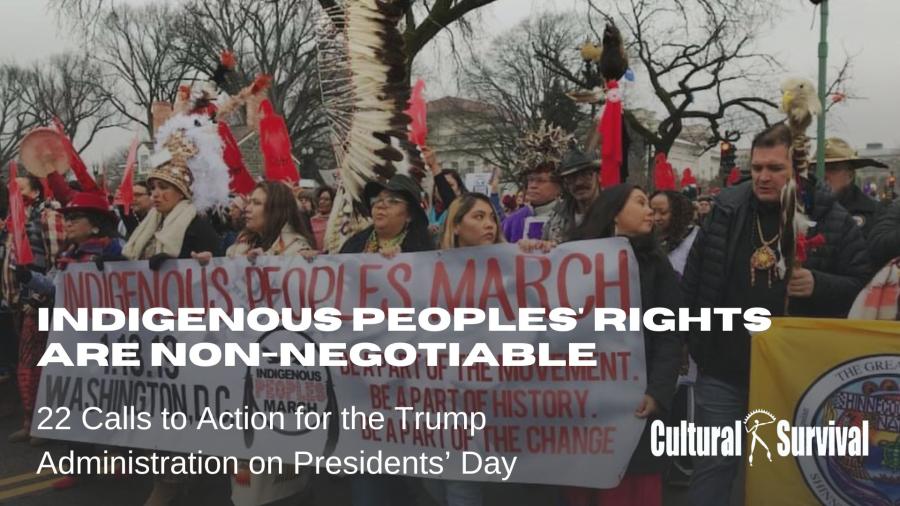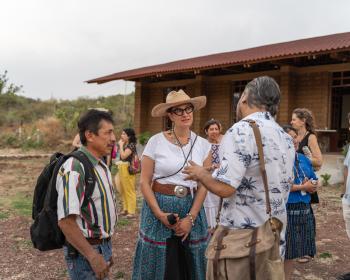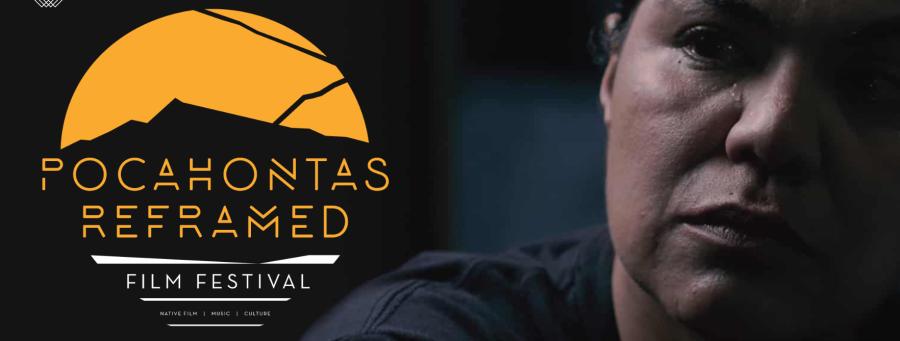Haunani-Kay Trask is an Indigenous Hawaiian poet, scholar, and activist recognized in the United States and abroad for her leadership in the Hawaiian sovereignty movement and her use of the written word as one of the tools to support that movement. Commenting on Trask’s poems in the preface for Night is a Sharkskin Drum, New Zealand scholar Witi Ihimaera says, “She does not simply write with a pen; she slashes with it.”
Trask received a doctorate in political science from the University of Wisconsin-Madison, was the founder and former director of the University of Hawai‘i’s Center for Hawaiian Studies, and is currently a full professor at the center. Despite her academic responsibilities, not to mention her political activism, Trask has managed to publish four books: From a Native Daughter: Colonialism and Sovereignty in Hawai‘i and Eros and Power: The Promise of Feminist Theory, and the poetry collections Light in the Crevice Never Seen and Night is a Sharkskin Drum. She has also worked as co-producer and scriptwriter for the award-winning film Act of War: The Overthrow of the Hawaiian Nation.
I recently talked with Trask about her poetry and its role in the sovereignty movement. Below are excerpts of that conversation.
Phoebe Farris: How do you balance the use of the arts, in this case poetry, to advance various social/political positions while still finding ways to be creative in an aesthetic sense?
Haunani-Kay Trask : The genre of poetry can use everyday statements for political analysis. A metaphor can be more political than a declarative statement because it gets to the heart of the feeling, and a metaphor says many things in a small moment.
What are your feelings about being—or not being—identified as part of the Asian Pacific Rim culture?
“The Pacific Rim” is a term invented by colonizers concerned with military connections related to islands in the Pacific. I prefer to identify as a Polynesian. I feel connected to writers from the other islands because we experience the same isolation. We usually have to fly to interact personally with each other. We are connected as Indigenous Peoples, as poets, not as military-based Pacific Rim persons. For years Indigenous Hawaiians have asked the University of Hawai‘i to bring other Polynesians here as visiting scholars instead of always inviting U.S. continental academics. We have tried to explain to the university administrators that we Indigenous Hawaiians are not Americans but Pacific Islander Polynesians. Being a Pacific Islander is its own entity. Finally the University of Hawai‘i listened to us and recently hired New Zealander Witi Ihimaera as a visiting distinguished professor.
How do you reconcile your identity as a poet and a political scientist?
Well, I am so thrilled to have this interview focus on my poetry. Most people are more familiar with my book From a Native Daughter, which deals with the rampant abuse of Native Hawaiian rights, institutional racism, gender discrimination, and the United Nations Declaration on the Rights of Indigenous Peoples. They are not as knowledgeable about my two books of poetry. I was pleasantly surprised at a recent political conference in April in Yakima, Washington, when students wanted me to autograph my poetry books.
Are there ways that your family background affected you as a creative writer and activist?
My great grandfather was a territory senator before statehood. His generation wanted statehood because they felt that statehood was being denied because Hawai‘i had a population dominated by people of color. The U.S. government did not want an Indigenous Hawaiian or other person of color in a congressional position. Now the Indigenous Hawaiian population is only 20 percent, with more living in California than in Hawai‘i. My father was a lawyer, and my mother was an elementary school teacher. My two sisters are lawyers and sovereignty activists, following my father’s path; my younger sister is a Hawaiian language immersion teacher, following my mother’s path; and one of my brothers is a fisherman and the other, now deceased, was a planter. Our family jokes that lawyers only produce propaganda but fishermen and planters produce food. The Trask family name is very prominent in Hawai‘i and was helpful in all of my career endeavors. I think my most important achievement has been building the Center for Hawaiian Studies and leaving that scholarly legacy to future generations of Indigenous Peoples. Indigenous Hawaiians have a saying, “We are all family.”
Phoebe Farris is the arts editor for Cultural Survival Quarterly. For more information on Haunani-Kay Trask go to her website: www.haunani-kaytrask.com.
“CHANT OF LAMENTATION,” from Light in the Crevice Never Seen
I lament the abandoned
terraces, their shattered
waters, silent ears
of stone and light
who comes trailing
winds through
taro lo‘i?
I lament the wounded
skies, unnourished
desolate, fallen drunk
over the iron sea
who chants
the hollow ipu
into the night?
I lament the black
and naked past, a million ghosts
laid out across the ocean floor
who journeys from
the rising to the setting
of the sun?
I lament the flowers
a‘ole pua, without
issue on the stained
and dying earth
who parts the trembling
legs enters where
the god enters, not
as a man but as a god?
I lament my own
long, furious lamentation
flung down
into the bitter stomachs
into the blood-filled streams
into the far
and scattered graves
who tells of those
disinterred, their
ground-up bones, their
poisoned eyes?



